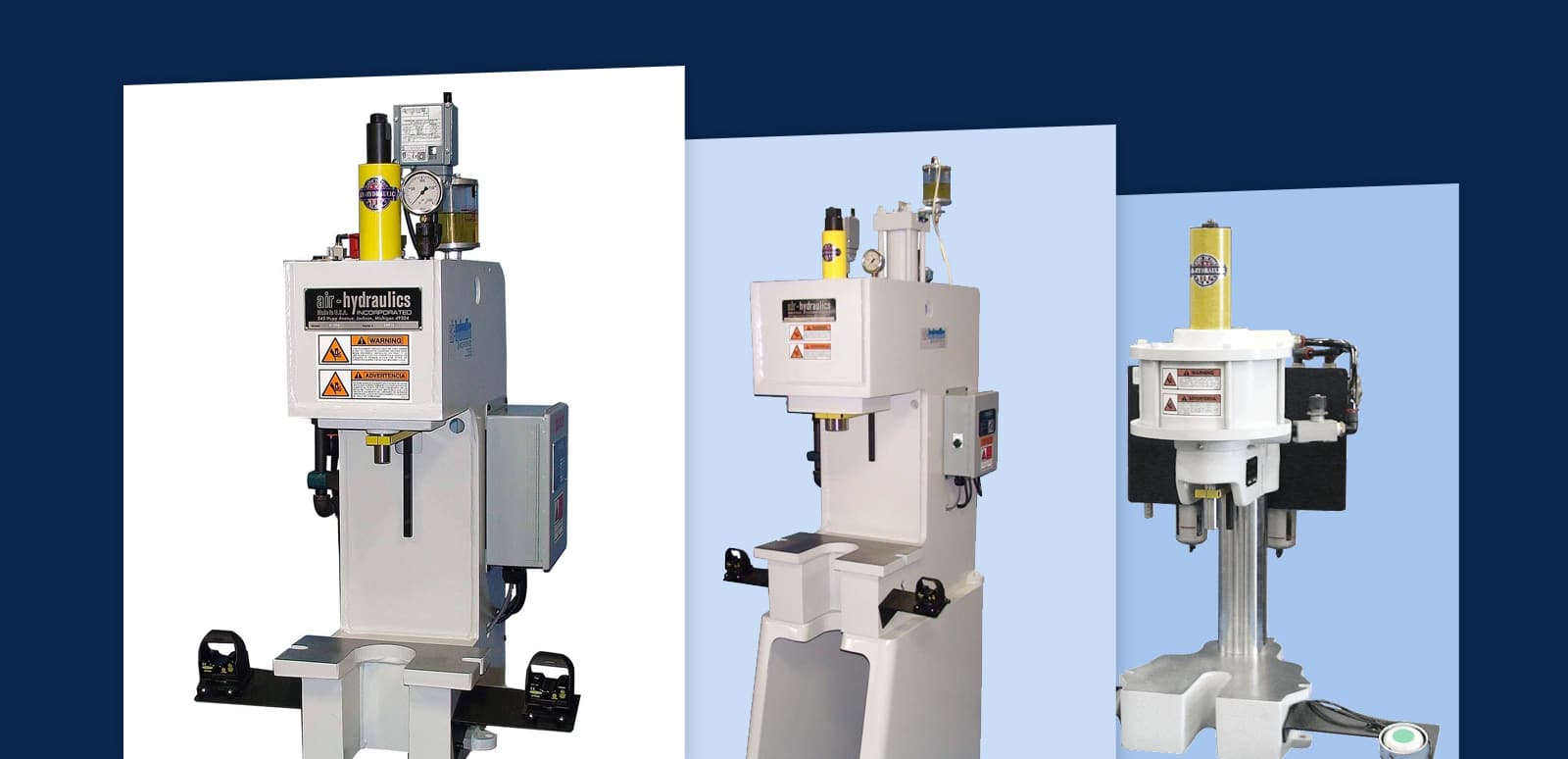
Hydraulic presses are often the first choice that comes to mind when browsing press options for your factory or shop. However, many shop owners or managers might not be aware of the alternatives to hydraulic presses. There are many other types of presses to choose from, and a hydraulic press might not be your best option. Let’s take a look at some alternatives to hydraulic presses.
Why Choose a Hydraulic Press Alternative?
First, why choose an alternative to a hydraulic press? There are a few factors to consider.
- Safety: Hydraulic presses can be operated safely, but they also have inherent hazards. Hydraulic presses are noisier than other types of presses, and sometimes require hearing protection when operating. Excessive heat, along with higher operating pressures could be a cause for concern. Lastly, they require high voltage electricity, so proper electrical installation must be taken into consideration when operating and maintaining hydraulic presses.
- Cost: Hydraulic presses tend to be the largest investment for metal forming and assembly projects. Even though they exert a wide range of forces and stroke lengths, they sometimes tend to be overkill for the application or intended use. Opting for a hydraulic press without researching other options could often result in over investing for your production needs.
- Maintenance: Hydraulic presses require more maintenance than many other presses. Without properly maintaining the seals, fluids, lubrication, motor, and other elements, the hydraulic press’ performance could deteriorate quickly over time and require expensive repairs, which result in production downtime. This not only increases the overall cost of your investment, but also requires additional time and energy needed to ensure that a hydraulic press is consistently maintained for adequate performance.
Wondering about alternatives to hydraulic presses?
Contact us to learn more about pneumatic and hydropneumatic presses
3 Alternatives to Hydraulic Presses
Pneumatic Press
While a hydraulic press uses compressed liquid to create force, a pneumatic press uses compressed air. Some of the strongest presses available are hydraulic presses, but these often exert far more force than necessary, and can actually damage your parts if they’re not sized correctly. Our pneumatic presses, also called air presses, can exert up to 5,000 lbs of force, and they don’t require a high-voltage power supply, like a hydraulic press does. However, a pneumatic press does require a source of compressed air to function.
When comparing pneumatic and hydraulic presses, it’s important to consider your applications and materials. Pneumatic presses are ideal for assembly, riveting, punching, and many other applications. Depending on your applications, it’s important to get the right amount of force for your press. This will help to ensure that your pneumatic press provides enough power, and ensure that you’re not overpaying for a hydraulic press with excessive force.
Hydropneumatic Presses
A hydropneumatic press, also called an air-over-oil press, uses a combination of compressed air and oil to create a great deal of force, often in the same range as most industrial hydraulic presses. For factories and shops that require a very powerful press, a hydropneumatic press is often a lower-cost, lower-maintenance alternative to hydraulic presses.
Hydropneumatic presses are similar to pneumatic presses in many ways. These machines both have similar maintenance requirements and safety features. Unlike hydraulic presses, hydropneumatic presses don’t require high-voltage power sources. They also aren’t as noisy as hydraulic presses, and are much less likely to cause hearing damage after consistent use. Compared to an air press, an air over oil press can be used for heavier applications like bushing and bearing insertion, stud insertion, swaging, and many similar operations.
Take a look at the two different hydropneumatic press options that are great alternatives to fully hydraulic equipment.
AH-Series Air Over Oil Presses with ½ in. Power Strokes
Most hydropneumatic presses only apply hydraulic intensified power within a half-in stroke. At Air Hydraulics, this would be our AH Series Hydropneumatic Presses that come in a range of 4 to 50 tons of force. These fast running and air efficient machines feature a rapid, low force approach stroke with a self-contained hydraulic intensified half-inch power stroke, making them great lower cost alternatives to full hydraulic for a range of forming and assembly applications like riveting, crimping, punching, swaging, joining and more.
Learn More About Our AH-Series Hydropneumatic Presses
C-Series Air Hydraulics Presses – Air Over Oil with Full Length Power Strokes
For heavier applications where full power is required at longer distances, our specially designed Air Hydraulics Presses, also referred to as our C-Series air over oil line offers something unique compared to any other hydropneumatic press on the market.
Air Hydraulics C-Series Presses offer a range of 2.5 to 15 tons of force, where pressure is maintained consistently throughout the entire stroke of the press cylinder. With a full length power stroke, these unique machines offer the convenience of pneumatic power with the force and performance on par with hydraulic machinery, making these presses the perfect lower cost, efficient hydraulic alternatives for bushing or bearing insertion, press fit, stud insertion and many other applications requiring full force at over half an inch in distance.
 Learn More About Our Uniquely Designed
Learn More About Our Uniquely Designed
Air Hydraulics C-Series Air-Over-Oil Presses
Choosing an Alternative to a Hydraulic Press
Choosing the right factory press depends on your applications, materials, factory set-up, and other considerations. A hydraulic press is often a default choice for many shops, but this can result in overpaying in upfront costs and maintenance costs down the line.
Consider these alternatives to hydraulic presses and to learn more about any press or see which ones might be best for your operation, contact us. We are press experts, and we can help you find the right design for your shop.
Browse information and recommended presses by Industrial Press Application >
